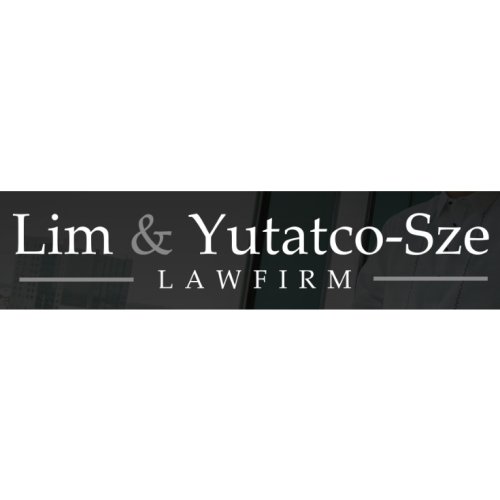Best Equity Capital Markets Lawyers in Manila
Share your needs with us, get contacted by law firms.
Free. Takes 2 min.
List of the best lawyers in Manila, Philippines
About Equity Capital Markets Law in Manila, Philippines
Equity Capital Markets (ECM) in Manila, Philippines relate to the legal and financial frameworks governing how companies raise capital by issuing shares or other equity-based instruments to investors. This area of law covers public offerings, private placements, rights issues, initial public offerings (IPOs), and other transactions where companies access capital from domestic and international investors. The legal landscape is shaped by local statutes, regulatory authorities, and market best practices, ensuring protection for both issuers and investors.
Why You May Need a Lawyer
Legal assistance is essential for various transactions and issues in Equity Capital Markets. You may need a lawyer if you are:
- A company planning to go public through an IPO or seeking to raise additional funds via secondary offerings.
- An investor trying to understand your rights, obligations, and protections when purchasing shares in a Philippine corporation.
- A business requiring guidance on compliance with securities regulations and listing rules set by the Philippine Stock Exchange (PSE) and Securities and Exchange Commission (SEC).
- Facing disputes involving shareholder rights, insider trading, or other compliance matters.
- Planning mergers, acquisitions, or restructurings that involve equity issuance or other capital market transactions.
- Seeking due diligence or risk assessment before participating in an equity offering.
A lawyer with expertise in Equity Capital Markets can help protect your interests, ensure regulatory compliance, and facilitate smooth transaction processes.
Local Laws Overview
Equity Capital Market activities in Manila, Philippines are primarily governed by the following laws and regulations:
- The Securities Regulation Code (Republic Act No. 8799) - Sets out registration, disclosure, and trading requirements for securities.
- The Revised Corporation Code of the Philippines - Provides corporate governance rules for Philippine businesses, including those listed on the Philippine Stock Exchange (PSE).
- Rules and regulations promulgated by the Philippine SEC, including those specific to IPOs and secondary offerings.
- Listing and disclosure rules established by the PSE for companies seeking to be listed or traded on the exchange.
These laws ensure transparency, fairness, and investor protection. Compliance is strictly monitored, with significant penalties for violations such as market manipulation or insider trading.
Frequently Asked Questions
What is an Initial Public Offering (IPO) in the Philippines?
An IPO is when a private company offers its shares to the public for the first time through the Philippine Stock Exchange. This process is regulated by the SEC and the PSE to protect investors and ensure market integrity.
Who regulates Equity Capital Markets in Manila?
The main regulatory bodies are the Securities and Exchange Commission (SEC) and the Philippine Stock Exchange (PSE). The SEC handles securities registration and enforcement, while the PSE manages listing requirements and oversees trading activities.
What are the requirements for companies to list on the PSE?
Companies must meet specific financial, legal, and governance requirements, including minimum capital, track record of profitability, public ownership, and comprehensive disclosures before listing on the PSE.
Are there restrictions on foreigners owning shares in Philippine companies?
Yes, certain industries have foreign ownership limitations set by the Philippine Constitution and other laws. These restrictions must be considered before allowing foreigners to invest in equity offerings.
What disclosures are required from listed companies?
Listed companies must provide prospectuses, regular financial reports, material information, and changes that may affect share prices. These disclosures promote transparency and protect investors.
How are shareholders protected in the Philippines?
Shareholders have rights under the Corporation Code and SEC regulations, including voting rights, right to dividends, access to corporate records, and protection against unfair practices by majority shareholders or directors.
What is insider trading and what are its consequences?
Insider trading is the illegal practice of trading shares based on non-public, material information. It is prohibited and can lead to severe penalties, including fines and imprisonment.
Can companies issue different classes of shares?
Philippine companies can issue various classes of shares, such as common and preferred shares, each with distinct rights and privileges, as approved by the SEC and outlined in the company’s articles of incorporation.
What happens if there are disputes between shareholders?
Disputes may be resolved through internal corporate mechanisms, mediation, SEC intervention, or litigation in Philippine courts, depending on the nature and severity of the conflict.
How can investors verify the legitimacy of an equity offering?
Investors can check the SEC’s database for registered offerings, review prospectuses and disclosures, and consult the PSE’s listed company directory. It is advisable to seek legal advice before investing.
Additional Resources
If you need further information or guidance related to Equity Capital Markets in Manila, consider the following resources:
- Securities and Exchange Commission (SEC) - Philippines: The main regulator for securities, providing guidelines, forms, and investor alerts.
- Philippine Stock Exchange (PSE): Central marketplace for buying and selling listed securities, along with comprehensive rules and disclosures.
- Bankers Association of the Philippines (BAP): Provides research, policy positions, and guidance for capital markets.
- Philippine Dealing & Exchange Corp (PDEx): For trading debt securities and related market developments.
- Integrated Bar of the Philippines (IBP): For finding accredited lawyers specializing in ECM and related fields.
Next Steps
If you require legal assistance in Equity Capital Markets, consider the following actions:
- Define your objective, such as raising capital, investing, or resolving a dispute.
- Gather all necessary documentation and details regarding your legal or financial concern.
- Contact a lawyer or law firm with proven experience in ECM transactions in the Philippines.
- Verify the credentials and background of your chosen legal counsel, ensuring they are in good standing with the relevant Philippine authorities.
- Be prepared to discuss your needs thoroughly and follow your lawyer’s advice regarding compliance, risk, and documentation involved in ECM activities.
Starting with a qualified lawyer will help protect your interests, ensure regulatory compliance, and provide peace of mind throughout your equity capital transaction or investment.
Lawzana helps you find the best lawyers and law firms in Manila through a curated and pre-screened list of qualified legal professionals. Our platform offers rankings and detailed profiles of attorneys and law firms, allowing you to compare based on practice areas, including Equity Capital Markets, experience, and client feedback.
Each profile includes a description of the firm's areas of practice, client reviews, team members and partners, year of establishment, spoken languages, office locations, contact information, social media presence, and any published articles or resources. Most firms on our platform speak English and are experienced in both local and international legal matters.
Get a quote from top-rated law firms in Manila, Philippines — quickly, securely, and without unnecessary hassle.
Disclaimer:
The information provided on this page is for general informational purposes only and does not constitute legal advice. While we strive to ensure the accuracy and relevance of the content, legal information may change over time, and interpretations of the law can vary. You should always consult with a qualified legal professional for advice specific to your situation.
We disclaim all liability for actions taken or not taken based on the content of this page. If you believe any information is incorrect or outdated, please contact us, and we will review and update it where appropriate.

















